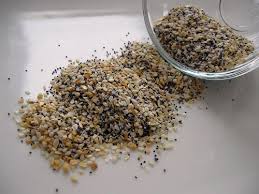If you live in America... you can almost get a bagel
anytime of the day- but if you are living somewhere
where they only have frozen ones to serve or they don't
know what a bagel even is.... maybe try this recipe.
Or just try it for fun. You can then say... you know how to
make bagels. Probably not something that will go on your
resume but, none the less- it can be interesting.
Ingredients:
1 cup of WARM water
1 packet of active dry yeast (1/4 ounce)
1.5 TBS granulated sugar or substitute Splenda
about 3 cups of all purpose flour (or multi-grain)
1 tsp salt
1 tsp vegetable oil
Procedure:
Combine the water, yeast and sugar and mix together.
(if you have a mixer that can mix dough... now is the time
to use it) if not- just use the force of your arm.
Gradually add in 1/2 the flour, salt and keep mixing
everything together. Continue to add the rest of the flour
gradually as you knead the dough with your hands.
Knead it on a cutting board with the board being lightly
floured to prevent the dough from sticking.
Once the dough is not sticky- you want to get a large bowl
and add the oil. Place the dough in the oil,
turning the dough so it gets coated in the oil.
You then need to cover it with plastic wrap and
let in sit for one hour. After the dough has been in time
out for one hour it will have practically doubled.
Take the dough out, and divide it into pieces.
(this recipe should be good for about 6 bagels)
It is easier if you make the dough into a ball, flatten it and then
pull a piece out for the center in the center- rather than making
a long piece and then joining the ends. Pull in from the middle!
Preheat the oven for 400 degrees.
Grease a baking sheet with a little oil.
(It makes sense to make 6 little blobs of oil where you think the
dough will sit on your pan-rather than coating the entire
pan with oil) In a big pot, boil some water (enough for the
bagels to be to be covered and then some.)
Add a TBS of sugar into the boiling water (optional)
Carefully drop your dough into the boiling
water for 30-45 SECONDS... no more than a minute.
Then, take it out of the water and place it onto the prepared pan
that will go into the oven. Bake the first side of the dough
for about 5 minutes. Turn the bagel over and bake the 2nd side
for about 30 minutes. Remove from the oven and let it cool
on a wire rack. There you have it... a home-made bagel.

If you enjoy everything bagels- you can always take some sea-salt,
toasted onion flakes, poppy seeds, toasted sesame seeds and of course
garlic and put it onto the bagel right before you pop them into the oven.




